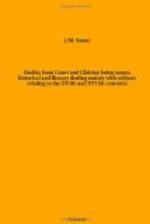At this interview, which was to have taken place at York, Henry hoped to convert his nephew to his own views regarding the Pope; and in order to pave the way to, a good understanding between them, he sent Barlow and Holcroft to Scotland with a lengthy document containing, with much fulsome flattery of James, all Henry’s choice vocabulary of epithets hurled against the “Bishop of Rome."*
* Hamilton Papers—Instructions to Barlow and Holcroft, 3rd Oct. 1535, fol. 27.
Margaret, ignorant that her son had discovered her treachery, continued to urge him to proceed to York; but her eagerness only roused his suspicions that worse treason lay behind.
“The Queen, your Grace’s sister,” wrote Lord William Howard to Henry, “because she hath so earnestly solicited in the cause of meeting, is in high displeasure with the King, her son, he bearing her in hand that she received gifts of your Highness to betray him, with many other unkind and suspicious words."*
State Papers, iv. 46; R.O.
Enough has been already seen of Margaret’s methods to make it quite clear what her next step would be. Out of favour with James, she of course threw the whole brunt of her misfortune on Henry, for whose sake she had incurred so much danger and expense, having lived for the last six months at court for the sole purpose of advancing his affairs.* But Henry was beginning to weary of his sister’s complaints and appeals for money. Besides, James would in future guard his secrets better, and Margaret almost cease to be useful as a spy. So she must not expect him to disburse notable sums, merely because she is his sister, and must henceforth learn to be content with the entirely sufficient provision made for her on her marriage with the King of Scots.**
* Add. Ms. 32, 616, f. 87; B.M.
** State Papers, v. 56; R.O.
This was all the consolation he could afford her for some time to come, for besides his other reasons for disregarding the letters which she, nothing daunted by his silence, continued to send him, Henry was too much occupied with his own concerns to bestow much thought on a sister whose power of helping him was now small. It was the moment of Anne Boleyn’s fall, and he was engrossed with the list of crimes of which he was about to accuse the unhappy woman.
On the subject of Margaret’s various marriages, her brother had ever failed to manifest that sympathy which a similarity of tastes would seem to justify. He had assumed the tone of a moralist on her separation from Angus, and had treated Lord Methven in his letters with scant respect, and when in the course of time she began to be weary of her new spouse, and to complain of him with increasing bitterness, it was long before Henry could be roused to express any interest in the subject. At last, however, he found a convenient season for attending to her. She had written to inform him that whereas she did Lord Meffen (sic) the honour to take him as her husband, he had spent her lands and profits upon his own kin, and had brought her into debt, to the sum of 8000 marks Scots, and would give her no account of it. She trusted the king her son would treat her to his and her own honour; but if not, she had no refuge but in Henry, and she begged him not to suffer her to be wronged.




